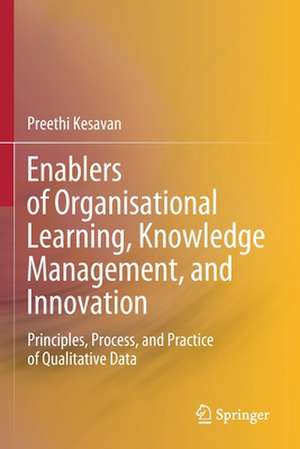Enablers of Organisational Learning, Knowledge Management, and Innovation: Principles, Process, and Practice of Qualitative Data
Autor Preethi Kesavanen Limba Engleză Paperback – 21 noi 2021
The methodological approach in the book uses innovation theory as a sensitizing concept to lay the foundation for the analysis of research data, suggesting approaches for empirical exploration of organizational learning, knowledge management, and innovation practices amongst geographically dispersed individuals and team members. Based on data obtained from a private educational organization that has offices dispersed across Asia through focus group discussions and interviews on these topics, the author highlights the need for integrating organizational learning, knowledge management, and innovation to improve organizational performance, exploring perspectives on collective relationships and networks, organizational characteristics and structures, and tacit and overt values which influence such innovation initiatives. In the process, the author puts forward a new theory which is built on three themes: relationship and networks, knowledge sharing mechanisms, and the role of social cognitive schema that facilitate emergent learning, knowledge management, and innovation.
| Toate formatele și edițiile | Preț | Express |
|---|---|---|
| Paperback (1) | 891.48 lei 6-8 săpt. | |
| Springer Nature Singapore – 21 noi 2021 | 891.48 lei 6-8 săpt. | |
| Hardback (1) | 897.65 lei 6-8 săpt. | |
| Springer Nature Singapore – 21 noi 2020 | 897.65 lei 6-8 săpt. |
Preț: 891.48 lei
Preț vechi: 1087.17 lei
-18% Nou
Puncte Express: 1337
Preț estimativ în valută:
170.61€ • 176.25$ • 141.99£
170.61€ • 176.25$ • 141.99£
Carte tipărită la comandă
Livrare economică 25 martie-08 aprilie
Preluare comenzi: 021 569.72.76
Specificații
ISBN-13: 9789811597954
ISBN-10: 9811597952
Ilustrații: XVII, 308 p. 8 illus., 1 illus. in color.
Dimensiuni: 155 x 235 mm
Greutate: 0.46 kg
Ediția:1st ed. 2021
Editura: Springer Nature Singapore
Colecția Springer
Locul publicării:Singapore, Singapore
ISBN-10: 9811597952
Ilustrații: XVII, 308 p. 8 illus., 1 illus. in color.
Dimensiuni: 155 x 235 mm
Greutate: 0.46 kg
Ediția:1st ed. 2021
Editura: Springer Nature Singapore
Colecția Springer
Locul publicării:Singapore, Singapore
Cuprins
Chapter 1. Introduction.- Chapter 2. Literature Review.- Chapter 3. Theory and Methodology.- Chapter 4. Methods and Introduction to Findings.- Chapter 5. Findings: Social Innovation, Architectural Innovation, and Cultural Innovation.- Chapter 6. Organizational Learning, Knowledge Management, and Innovation Integrated.- Chapter 7. Conclusion.
Notă biografică
Preethi Kesavan has extensive teaching and learning experience, educational leadership, and executive oversight of strengthening a high-quality student experience, enriching student global mobility, and enhancing academic quality and professional staff effectiveness. She has extensive experience in the Singapore Private Education systems and local public universities, online/mobile/blended learning and professional learning initiatives, quality assurance of curriculum, assessment, and people development and organizational policy development. She is a contemporary architect of flexi-learning, blended learning, e-learning, and education management. She has also designed and implemented IT solutions for the hospitality industry and private schools. She enjoys teaching various programming languages, database and enterprise solutions, and a strong interest in teaching and research activities in spreadsheet modelling and analytics.
Textul de pe ultima copertă
This book establishes constructivist, interpretivist, and linguistic approaches based on conventions about the nature of qualitative and text data, the author’s influence on text interpretation, and the validity checks used to justify text interpretations. Vast quantities of text and qualitative data in organizations often go unexplored. Text analytics outlined in this book allow readers to understand the process of converting unstructured text data into meaningful data for analysis in order to measure employee opinions, feedback, and reviews through sentiment analysis to support fact-based decision making. The methods involve using NVivo and RapidMiner software to perform lexical analysis, categorization, clustering, pattern recognition, tagging, annotation, memo creation, information extraction, association analysis, and visualization.
The methodological approach in the book uses innovation theory as a sensitizing concept to lay the foundation for the analysis of research data, suggesting approaches for empirical exploration of organizational learning, knowledge management, and innovation practices amongst geographically dispersed individuals and team members. Based on data obtained from a private educational organization that has offices dispersed across Asia through focus group discussions and interviews on these topics, the author highlights the need for integrating organizational learning, knowledge management, and innovation to improve organizational performance, exploring perspectives on collective relationships and networks, organizational characteristics and structures, and tacit and overt values which influence such innovation initiatives. In the process, the author puts forward a new theory which is built on three themes: relationship and networks, knowledge sharing mechanisms, and the role of social cognitive schema that facilitate emergent learning, knowledge management, and innovation.
Caracteristici
Provides insights on the application of text mining, text analytics process, and adopting qualitative methods in investigating the factors that influence learning, knowledge management, and innovation in dispersed teams within organizations Discusses how companies must make efforts to create an environment to support social interaction in order to develop their knowledge management approaches and execute innovation practices in such teams Suggests practical approaches that allow sufficient space for variety in each organization based on cultural, geographical as well as industry requirements
